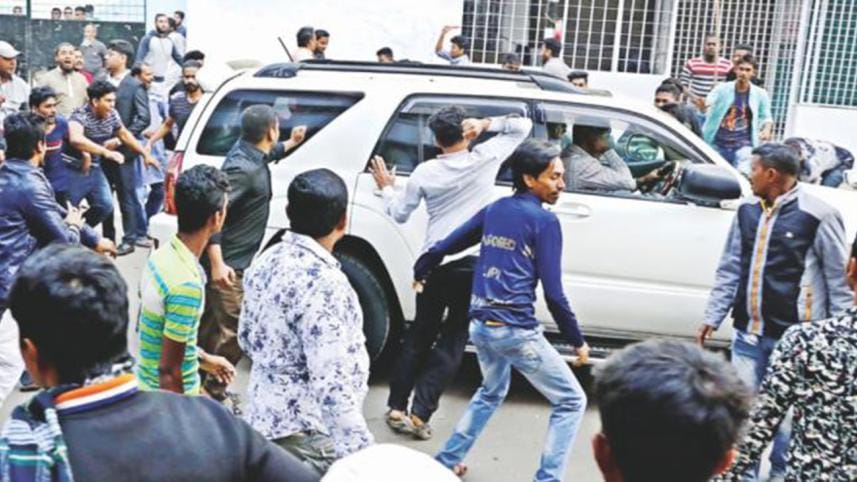Protect candidates to ensure a credible election: HRW

A repressive political environment in Bangladesh ahead of the December 30, 2018 national elections is undermining the credibility of the process, Human Rights Watch said in a report released today.
“Bangladeshi authorities should impartially investigate allegations of election violence and ensure that those responsible are held to account,” the report said.
The 37-page report, “Creating Panic”; Bangladesh Election Crackdown on Political Opponents and Critics,” finds that authoritarian measures, including widespread surveillance and a crackdown on free speech, have contributed to a widely described climate of fear. While there have been violent attacks by supporters of all rival political parties, the authorities have failed to act impartially, Human Rights Watch said. The police have arrested and detained opposition members, but failed to act properly against ruling party supporters when they target opposition candidates.
“To ensure that the elections meet international standards, the police and election commission should not appear to be acting like extensions of the ruling party,” said Brad Adams, Asia director at Human Rights Watch.
“The violence during the campaign that has mainly targeted the opposition bears out their misgivings about unfair treatment,” the report added.
This report, based on more than 50 interviews with political activists, students, and members of civil society, and analysis of court records and secondary sources, documents repeated instances of arbitrary security force arrest and detention of protesters and political opposition figures, and acts of violence and intimidation by members of the ruling party’s student and youth wings.
Institutions, including the judiciary and the election commission, do not appear to be fully prepared to independently and fairly resolve disputes around campaigns and elections, such as on registration, candidacies, and results, the HRW recommended.
Political leaders in Bangladesh should instruct their followers to end the rapidly escalating campaign of violence, Human Rights Watch said.
Human Right Watch also found that the Bangladesh authorities have tried to stifle dissent and criticism including on newspapers, television networks, and on social media. Journalists said that the Digital Security Act (DSA) effectively prohibits investigative journalism. Bangladeshis are under pressure to self-censor on social media or risk arrest.
Widespread electoral violence started as soon as the candidate lists were formally approved, and campaigning began, says Human Rights Watch.
On December 11, two members of the ruling Awami League (AL) were killed in separate incidents, and on December 16, a party office was vandalized. However, much of the campaign violence has targeted the opposition Bangladesh National Party (BNP) and the opposition coalition Jatiya Oikya Front (National United Front). While the police promptly opened investigations and made arrests in attacks on the ruling party, it ignored complaints from the opposition.
Each of the main parties has blamed the other for the violence. But in cases when the victims belonged to the opposition, the police and Election Commission have typically declined to take action, or even to acknowledge that the incident occurred. BNP candidate Mohammad Asaduzzaman told Human Rights Watch that after his campaign in Jhendaidah was attacked on December 11, he has repeatedly filed complaints to the commission. “They acknowledge receipt, but take no action,” he said.
The media have reported a series attacks on BNP candidates including against Abdul Moyeen Khan on December 16; Afroza Khanam Rita on December 12; and on vehicles accompanying BNP secretary general, Mirza Fakhrul Islam Alamgir on December 11. Romana Mahamud, another BNP candidate, was injured during clashes between the police and her supporters on December 15.
On December 14, alleged members of the ruling party attacked vehicles carrying the Oikyafront leader, Kamal Hossain. While he was unharmed, at least 25 other people were injured, the HRW added quoting media reports.
Bangladesh should take immediate steps to uphold its obligations under the International Covenant on Civil and Political Rights (ICCPR), including rights against arbitrary arrest and detention, the right to freedom of expression, and the right to political participation, Human Rights Watch said.
The United States has announced that it will send election observers, and the House of Representatives called on political leaders and judicial authorities to ensure that the elections are “impartial and inclusive.” The European Union is deploying an election expert mission, the United Kingdom is supporting local monitoring, and the Commonwealth are considering a request for observers.
“To mitigate the risks of further violence before and after election day, all parties should insist that their supporters desist from violence and the authorities should uphold the law in a neutral fashion,” Adams said.
“International actors who care about stability and democracy in Bangladesh should continue to publicly press the Bangladesh government to create the conditions for a credible election.”



 For all latest news, follow The Daily Star's Google News channel.
For all latest news, follow The Daily Star's Google News channel.
Comments